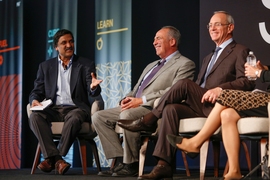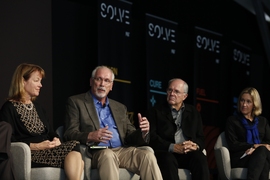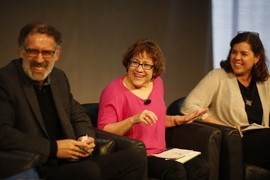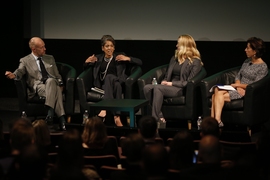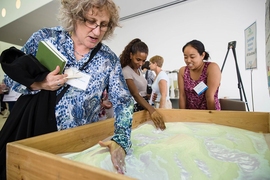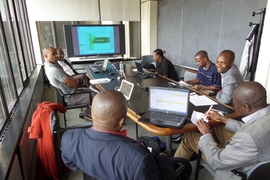Pedestrians walking by the MIT Media Lab earlier this week might have noticed an interactive public installation challenging visitors to rethink high school in America. Developed by XQ: The Super School Project — an initiative aimed at bringing people together to design the next-generation American high school — the installation offered viewers a chance to journey through the history of public education in the U.S., as well as an opportunity to record and share their own ideas for how to transform the high school experience.
XQ Board Chair Laurene Powell Jobs and CEO Russlynn Ali came to MIT this week to discuss the Super School Project and the necessity of transforming American high schools as part of a roundtable discussion held Wednesday evening during Solve, a four-day event at MIT. The discussion also featured Rhode Island Gov. Gina Raimondo, and was moderated by Jason Pontin, editor-in-chief and publisher of MIT Technology Review. Participants focused on how to redesign American high schools so that they can more effectively meet the needs of students from a wide variety of backgrounds, preparing them for the jobs of the future.
The discussion culminated a day of events centered on how to successfully transform education. Concepts discussed ranged from better support for teachers to making universities a partner in lifelong learning.
Raimondo kicked off the roundtable discussion by explaining her desire to bring innovation to the delivery of education. She noted that her primary focus as governor is bolstering Rhode Island’s economy, and that to accomplish this goal the state needs to train more skilled workers.
“The vast majority of jobs are requiring postsecondary skills, not necessarily four-year college, and people to be collaborative problem solvers and creators. And our schools are not doing that now,” Raimondo said. “We need to be teaching relevant skills, we need to be bringing corporate partners and mentors with practical experiences and people into the classroom, and we need to be relentlessly hands-on [and] collaborative.”
Ali and Powell Jobs expanded upon this point, noting that 65 percent of students will end up in jobs that do not exist today. They also underscored the role schools need to play in training students so that they can adapt to, and succeed in, an ever-changing job market.
Ali also noted that while education can be a great equalizer, offering economic and social mobility, the nation’s current public education system perpetuates the achievement gap by not adequately preparing students in low-income districts for college. One example she offered: Only about 50 percent of American high schools offer courses in calculus, a piece of data that drew gasps from the audience.
Powell Jobs added that generally 40 to 60 percent of low-income students need to take remedial courses when they enter college, which “pushes out their tenure at the university or at the college from four years to five or six years, whereas they have financial aid or funding for four years. So there is an immediate structural inequity that happens.”
Raimondo noted that in an effort to counter this problem, Rhode Island now offers its students the opportunity to take college-level courses while still in high school.
Powell Jobs also highlighted that the current public education system was designed for a different workforce than exists today. “Everything else in our lives has changed dramatically — how we live our lives, how we get from here to there, how we communicate — and yet high school has not changed,” she said.
Ali and Powell Jobs stated that XQ aims to reinvent the current educational system into one that will prepare students for 21st-century jobs. Teams of educators, students and others from across the country are invited to submit ideas to the XQ challenge on how they would change American high schools. Winning teams will be provided with guidance and financial support to set about making their plans a reality.
The organizers of XQ hope to share results from the winning teams, relating which ideas were successful and the challenges associated with implementing them. They believe that doing so will also allow educators across the country to learn and grow.
Pontin said that what he finds most radical about the XQ approach is that it “presupposes that there is no one single model and that schools must be liberated to try what works for them, and that that could be a model of experimentation across the country.”
During the discussion, participants discussed how educational attainment serves as the primary predictor of income mobility. Currently, “educational attainment is reserved for the upper classes,” Powell Jobs said, adding that such a system should not be tolerated.
When Pontin asked whether the problem with America’s high schools might be a lack of emphasis on education in American culture, Ali said it was more a problem of the system. “No matter how much I wanted to consume it, I wasn’t going to get physics,” she said. “It wasn’t offered in my schools, it wasn’t offered in my district.”
Likewise, Powell Jobs emphasized the difficulties for many low-income parents, who often juggle multiple jobs, in attending parent-teacher sessions or aiding with homework assignments. “We need to make sure that school works for every single student,” she said.
